By LISA EISENHAUER
One of the keys to showing mercy to the nation's most vulnerable and helping them improve their lives is for health care providers to engage deeply with the communities where the vulnerable live, keynote speaker Bryan Stevenson said during a session of the Catholic Health Assembly.
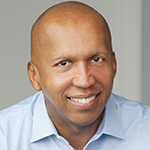
Bryan Stevenson
"We cannot advance justice if we isolate ourselves in spaces where we are shielded from the problems of the poor and the most vulnerable," said Stevenson. "Justice only comes when we actually situate ourselves in spaces where there's often injustice."
Stevenson was one of several health equity or human rights activists to speak at the assembly, delivering a powerful commentary on June 15, the last day of the two-day event. The annual meeting brought together about 700 senior leaders of Catholic health systems, hospitals and long-term care providers. The gathering's theme was "All God's Children" and much of the event was focused on how CHA and its members are confronting racism by addressing disparities and inequities in health care and in their communities. Because of the pandemic, the gathering was held virtually for the second year in a row.
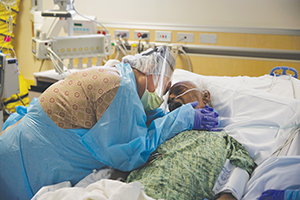
Romelia Navarro, 64, weeps while hugging her husband, Antonio, in his final moments in a COVID-19 unit at Providence St. Jude Medical Center in Fullerton, California, on July 31, 2020. The hospital is part of Providence St. Joseph Health. The pandemic has taken an outsized toll on communities of color, a tragic inequity many members of CHA have pledged to address.
Jae C. Hong/Associated Press
Stevenson is a lawyer and the founder and executive director of the Equal Justice Initiative, a human rights organization based in Montgomery, Alabama. He has dedicated his career to helping those who are poor or incarcerated. His book Just Mercy looks inside the nation's criminal justice system and its disproportionate impact on minorities. It was made into a movie in 2019.
Stevenson offered some staggering statistics on the nation's criminal justice system, including that the prison population has grown from 300,000 in the 1970s to 2.3 million today, that 70 million Americans have criminal arrest histories that diminish their opportunities to get jobs and mortgages, that the number of women sent to jails or prisons has increased by 800% in the last 25 years and that the Bureau of Justice Statistics estimated in 2001 that one in three Black male babies born in the United States would serve time.
Politics of fear and anger
He said the high incarceration rate is the result of a long-standing political narrative that makes nonwhite Americans the focus of fear and anger. That narrative is rooted in beliefs by whites going back to the nation's origins that people of color are less worthy and less capable, he added.
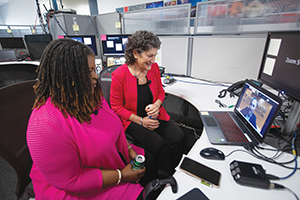
Catholic Health Assembly co-hosts Carol Daniel, left, and Sr. Mary Haddad, RSM, greet keynote speaker Daniel Dawes prior to his presentation on how public policy and politics shape the social conditions that generate health outcomes. Dawes directs the Satcher Health Leadership Institute at the Morehouse School of Medicine. Daniel is a broadcast journalist in St. Louis. Sr. Mary is CHA's president and chief executive officer.
Karen Elshout/©CHA
The narrative has led to policies that rely on punishment rather than on providing opportunities or treatment to improve society, Stevenson said. "We should have been reaching out to the Catholic Health Association rather than building more jails and prisons and creating more punishment, but we didn't do the right thing because we were, I believe, corrupted by the politics of fear and anger," he said.
To reverse this course, Stevenson said the nation must embark on an era of reckoning aimed at promoting truth and justice, as happened in South Africa after apartheid was dismantled and in Germany in the aftermath of the Holocaust.
"I have no interest in punishment," he said. "My interest is in liberation. My interest is in restoration. My interest is in repair. It's how we move forward."
Addressing disparities
Earlier in the year, CHA launched a major initiative, We Are Called, with a goal of elevating ministry members' work on diversity, equity and inclusion.
About two dozen of the nation's largest Catholic health care systems have committed to the Confronting Racism by Achieving Health Equity pledge that is part of the initiative. The pledge calls for signatories to ensure equity in COVID-19 care, examine all aspects of their organizations, build right and just relationships with communities, and advocate for polices to end health disparities and systemic racism.
Dismantling barriers
Another keynote speaker, Daniel Dawes, called CHA's equity pledge "one of the boldest calls to action that I have seen." Dawes is director of the Satcher Health Leadership Institute at the Morehouse School of Medicine and is its associate lead for government relations. He's also an author whose newest book, The Political Determinants of Health, addresses the question of how policy and politics influence the social conditions that generate health outcomes.
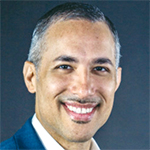
Daniel Dawes
Dawes said that the social determinants of health in communities, such as economic stability and access to health care, can be traced back to political decisions. "Simply stated, the nation's health is not an organic outcome," he said.
He said the structural barriers that have disadvantaged minorities and other vulnerable groups have been as blatant as slavery and Jim Crow laws and as covert as the redlining done by government agencies and banks decades ago that denied access to mortgages to buy homes in many neighborhoods. Banned by federal law more than 50 years ago, the practice has, to this day, taxed minority communities with lower rates of home ownership. Home equity typically makes up a significant portion of household wealth.
"You see, too often we've been stopping at the social drivers of health inequities, failing to look back and dig deeper to see and understand its root causes and distribution; and, as a result, we've been missing the link between the social determinants of health and their policy roots," he said.
Urging leadership
Dawes urged CHA and its members to continue the leadership they showed in advocating for the Affordable Care Act as they push for other policies that will foster health equity. He mentioned the current debate in Congress over a wide-ranging infrastructure plan as an example of policymaking that could have a deep impact on communities.
Working to shape political determinants is "not a movement for the faint of heart," Dawes said. He added: "We must have the courage to do enough, and we must persevere until the job is done."
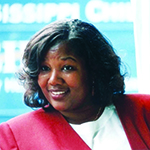
Gloria Wilder
Another keynote speaker, Dr. Gloria A. Wilder, also encouraged CHA members to continue to boldly lead the charge to end health disparities. She said COVID-19 laid those disparities bare.
"We've experienced the atrocities of a virus that took hold and awoken us all to the very difficult situation that many people were suffering through — and that situation was social injustice," said Wilder, a pediatrician and expert on poverty and social justice.
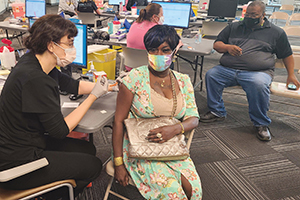
A woman gets inoculated against COVID-19 at a clinic that Mercy hosted specifically for residents of a largely minority neighborhood of Kirkwood, Missouri, a suburb of St. Louis.
Mercy
She has served as the chair of Mobile Health Programs at Georgetown University and Children's National Medical Center in Washington. In 2005, she founded Core Health, a health and wellness company dedicated to assisting underserved communities in gaining access to quality holistic health care services.
Road to equality
Wilder said that the larger push for equality and social justice will not succeed without equity. "Equity is the path, it's the road to equality," she said. "It's the very thing that you walk upon to achieve it."
Health organizations can promote equity in several ways, Wilder said. They include investing in the communities that surround their hospitals, uplifting primary care providers who work in poor communities, and appointing chief equity officers to foster reforms inside and outside of their organizations.
"Health equity is not something that's going to change overnight," Wilder said. "It took 400 years of racism to create the disparities that we see every day in our country and it's going to take time to change it, but I'll tell you, we're not waiting 400 years. Change will come because we will make change happen."